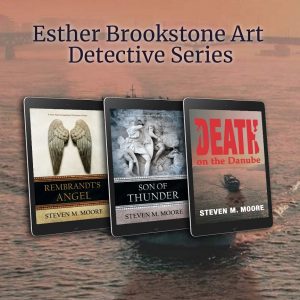It’s better to blossom late…
 …than to never blossom. Yeah, I’m a macho writer who likes flowers…and floral metaphors! In the title-line, I’m referring to my more-than-two-decades spent publishing my fiction after spending half the twentieth century during other stuff, of course. Although I collected ideas for many years—character- and scene-sketches, the first even with interesting names; dialogue snippets heard here and there, or only in my mind; and themes and plots for sci-fi, mystery, and thriller stories—I didn’t start my publishing career until just before retirement from my day-job, spurred on by the events of 9/11, for the most part. That awful event made me hate terrorists and terrorism, and deciding that the only good terrorist is a dead one! In fact, my very first published novel, the futuristic thriller Full Medical (now the first novel in the “Clones and Mutants” trilogy) was partially about how evil men and women can use terrorism to satisfy their greed and further their power over others. That novel was dedicated to a relative we lost in 9/11.
…than to never blossom. Yeah, I’m a macho writer who likes flowers…and floral metaphors! In the title-line, I’m referring to my more-than-two-decades spent publishing my fiction after spending half the twentieth century during other stuff, of course. Although I collected ideas for many years—character- and scene-sketches, the first even with interesting names; dialogue snippets heard here and there, or only in my mind; and themes and plots for sci-fi, mystery, and thriller stories—I didn’t start my publishing career until just before retirement from my day-job, spurred on by the events of 9/11, for the most part. That awful event made me hate terrorists and terrorism, and deciding that the only good terrorist is a dead one! In fact, my very first published novel, the futuristic thriller Full Medical (now the first novel in the “Clones and Mutants” trilogy) was partially about how evil men and women can use terrorism to satisfy their greed and further their power over others. That novel was dedicated to a relative we lost in 9/11.
Whether sci-fi, mystery, or thrills, or combinations thereof, the tales kept coming because, once I opened that creative dam’s floodgates in my mind, my writing life meant a lot more to me than chasing a little white ball around a golf course. (In retrospect, maybe a lot better for my mental health than physical health?) Most of the time, I haven’t worried too much about attracting readers to my creations either. While readers are generally important—generally speaking, what would authors do without them?—and I’m much more an avid reader than a prolific author, there’s no real economic need for me to worry about them too much. In fact, I’ve always felt that if each of my stories—novel, novella, or short story—can entertain at least one reader, then that story is a success.
I’m a late bloomer as a storyteller primarily because I was responsible enough to realize it was unlikely that I could support myself and later my family as a writer. This is more true now because there’s a lot more competition. (I’ve been banned from discussion groups because I say that. Too many idiots nowadays can’t accept the truth!) The Irish blarney in me, though, still broke free from those pessimistic constraints as I neared my early retirement from a stressful day-job. I’m perhaps either one of the most prolific and speediest writers you’ll ever read, or the biggest flop in the history of writing fiction. That’s just one publishing example of true freedom of expression, of course. I accomplished a lot in the last twenty-plus years; I’ve learned a lot and had a lot of fun too. But I’ve also mostly charted my own course.
It’s possible that my stories don’t resonate well because they treat complex themes in fiction that I also worry about in real life. In my storytelling, some of my characters can solve some of life’s problems; real life is another matter. Terrorism is obviously one of those, but there are many others. Not to an evangelical prophet shouting in a vast wilderness of indifference—heaven forbid!—I can summarize all my many plots as portrayals of the endless battles where good is fighting evil. That should be popular and universally appealing to readers, but in today’s publishing environment—of farfetched fantasies, ridiculous romances and hyper-erotic tales, contrived horror stories, cozy mysteries and unbelievable technological thrillers—my expectations were always low: Escapism sells now; real-life situations apparently don’t.
“Clones and Mutants” is just one series out of my seven. Looking back at writing all of them is a sobering experience because I never start a novel with the intention of making it the first in a series. It’s just that, after I finish a novel, I’m often left liking the characters so much that I listen to their pleas to me to tell the world about more of their adventures. And adventures they are; they’re all adventures about that eternal fight between good and evil.
There are so many good books and good authors around now that I’m probably in good company; i.e., there are many fiction writers like me who have had very little success. With addictive streaming video, computer games, and social media wasting people’s time, is it any wonder that the number of avid readers (let’s define them generously as people who read more than twelve books per year) is dwindling to historically low levels? My unsuccessful publishing history is probably becoming more common every year that passes. In general, and for my fellow authors, that would be a shame! In my case, I don’t really care care all that much.
[Note from Steve: The photo is of the wisterias blooming at the Van Vleck mansion in Montclair, NJ early this spring.]
***
Comments are always welcome. (Follow the rules on my “Join the Conversation” web page.)
 “Writing Fiction.” In the list found on my “Free Stuff & Contests” web page, you will see that a lot of free PDF downloads are available. Most are free fiction. One exception is this little course that summarizes in greater detail what I’ve learned about publishing fiction in my few decades of doing it. A lot of it amounts to confessions like in the above article, but you might find this little course useful if only to avoid my mistakes. There’s also an appendix on how to self-publish using Draft2Digital (now combined with Smashwords), which is the most efficient way to get your novels “out there.” (I wish it had existed when I was starting!) In regards to the free fiction: It’s quality stuff—I don’t let the reading public see anything that hasn’t been written and completely edited with care—but I can’t afford to publish everything. In particular, there are two full novels and several novellas (a new prequel one features Esther Brookstone). Happy downloading!
“Writing Fiction.” In the list found on my “Free Stuff & Contests” web page, you will see that a lot of free PDF downloads are available. Most are free fiction. One exception is this little course that summarizes in greater detail what I’ve learned about publishing fiction in my few decades of doing it. A lot of it amounts to confessions like in the above article, but you might find this little course useful if only to avoid my mistakes. There’s also an appendix on how to self-publish using Draft2Digital (now combined with Smashwords), which is the most efficient way to get your novels “out there.” (I wish it had existed when I was starting!) In regards to the free fiction: It’s quality stuff—I don’t let the reading public see anything that hasn’t been written and completely edited with care—but I can’t afford to publish everything. In particular, there are two full novels and several novellas (a new prequel one features Esther Brookstone). Happy downloading!
Around the world and to the stars! In libris libertas!
